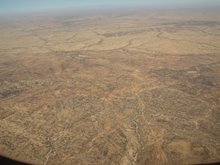Here is a selection of the news today from various news sources:
Greg Myre - New York Times
At least 17 people were killed Friday, including a 7-year-old boy, bringing the total for the past two days to 23. Most of the dead were security force members belonging to Hamas or Fatah, as well as other fighters, but several civilians were also killed.
BBC
At least 102 people have been killed and 215 injured in a lorry bombing at a market place in central Baghdad, Iraqi security officials have said.
Mazen Mahdi - Arab News
Several hundred demonstrators yesterday clashed with authorities after the arrest of two key opposition figures along with a relatively unknown rights activist earlier in the morning. Police reportedly responded with tear gas and rubber bullets.
Daily Star
Iran and the United States continued to blame each other for the raging violence in Iraq on Friday, with Iranian Foreign Minister Manouchehr Mottaki slamming US "militaristic" policies in the region and US Defense Secretary Robert Gates insisting his country was not planning to wage war against Tehran.
The current turmoil in the Middle East is not the result of homegrown atavism - although the 'ties that bind' shape these conflicts. The conflicts are all fuelled, if not in some cases created, by a newly polarised international order. Unlike the 1990s, when I travelled and lived extensively in the Middle East, the region is again caught up in a Arab Cold War. The 'anti-terror', pro-democracy countries gathered around the US, pitted in indirect and proxy conflicts against the supposedly 'pro-terror' groups such as Hamas, the regime in Khartoum, Hezbollah and Iran. Each of these sides is supplying weaponry, resources and political capital to their chosen allies and fanning the flames of conflict that we see today. The first annual Human Security Report (a must read study of the changing nature of armed conflict) had this to say about the Cold War:
The most persuasive explanation for the decline in civil conflict [during the 1990s] is found in the far-reaching political changes wrought by the end of the Cold War. What were the forces that drove the decline?
First, as already noted, the end of the Cold War removed a major driver of ideological hostility from the international system. This affected civil wars as well as international wars.
Second, the end of the Cold War meant that the two superpowers largely stopped supporting their clients in proxy wars in the developing world. Denied this support, many of these conflicts died out, or the parties sued for peace. But less than 20% of the post–Cold War decline in conflict numbers appears to be attributable to this factor.
Third, and most important, the end of the Cold War liberated the UN, allowing it for the first time to play an effective global security role—and indeed to do far more than its founders had originally envisaged. The impact of this wave of post–Cold War activism on the global security front — which went well beyond the UN — has been both profound and the subject of extraordinarily little study.

No comments:
Post a Comment